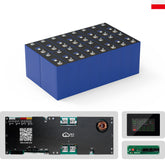4Ah vs 6Ah Battery, Is A Higher Ah Battery Better
When choosing a battery for your device or application, one of the most important decisions revolves around the battery’s capacity, typically measured in amp-hours (Ah). Batteries with different Ah ratings, such as a 4Ah and a 6Ah battery, can perform differently based on how long they last, how much power they deliver, and what type of device they’re being used in. But what exactly do these differences mean for your battery’s performance, and is a higher Ah battery necessarily better? In this article, we will explore the key differences between a 4Ah and 6Ah battery, helping you make an informed decision based on your needs.
Understanding the difference between a 4Ah and 6Ah battery can be crucial for determining the right power source for your needs. Whether you're using it for a power tool, electric vehicle, or renewable energy system, understanding how battery capacity affects performance is essential for maximizing efficiency and longevity. So, let's take a closer look at the differences, advantages, and disadvantages of both 4Ah and 6Ah batteries to help you choose the best option.
- 4Ah vs 6Ah Battery Which One Is Better for Your Device?
- Which Battery Is Better for Your Needs? 4Ah vs 6Ah Battery
- Advantages and Disadvantages of 4Ah vs 6Ah Batteries
- 4Ah vs 6Ah Battery Which One Is Better?
4Ah vs 6Ah Battery Which One Is Better for Your Device?
The capacity of a battery, measured in amp-hours (Ah), directly affects the runtime and overall performance of the device it powers. The more amp-hours a battery has, the more energy it can store and deliver over time. But how do these two sizes—4Ah vs 6Ah—compare? Let’s break it down.
Understanding Battery Capacity (Ah) and Its Impact on Performance
Battery capacity is a measure of how much energy a battery can store. The amp-hour rating indicates the amount of current a battery can provide over the course of an hour. So, for example, a 4Ah battery can provide 4 amps of current for 1 hour, or 1 amp for 4 hours, and so on. The same logic applies to a 6Ah battery, which can provide 6 amps of current for 1 hour, or 1 amp for 6 hours, and so on.
This means that a 6Ah battery, compared to a 4Ah battery, can store more energy and power a device for a longer period. However, the total performance depends on the type of device being powered and the power draw. Let’s look at how this affects battery selection across different devices.
Battery Life Comparison: 4Ah vs 6Ah Battery
When comparing a 4Ah vs 6Ah battery, the key difference is the runtime. A 6Ah battery will generally run a device for a longer period than a 4Ah battery. However, the actual runtime depends on the power consumption of the device. For example, let’s say you are using a 4Ah battery to power a tool that consumes 2 amps per hour. This battery will last for approximately 2 hours before needing to be recharged (4Ah / 2A = 2 hours).
Now, using the same device, a 6Ah battery will provide 3 hours of runtime (6Ah / 2A = 3 hours). This extended runtime is a key advantage when using devices like power tools, flashlights, or electric vehicles, where longer periods of power are needed without recharging.
Example: Power Tools
For a power tool that uses 3 amps of power per hour:
- A 4Ah battery would last approximately 1.33 hours (4Ah / 3A = 1.33 hours).
- A 6Ah battery would last approximately 2 hours (6Ah / 3A = 2 hours).
In this case, the 6Ah battery offers a 50% longer runtime, which could be crucial in applications that require sustained power.
Weight and Size: 4Ah vs 6Ah Battery
The trade-off for a higher-capacity battery is typically an increase in size and weight. A 6Ah battery will often weigh more than a 4Ah battery, which can be an important consideration for portability. Devices that require a compact, lightweight battery may be better suited for a 4Ah battery, while devices that are less concerned with weight may benefit from the additional power and longer runtime provided by a 6Ah battery.
Example: Electric Vehicles
In the case of electric bicycles or scooters, for example, the difference in weight between a 4Ah and 6Ah battery can impact the overall performance and range. While the 6Ah battery may provide more range, it also adds weight, which could affect the speed or handling of the vehicle. In this situation, the choice between a 4Ah and 6Ah battery may come down to the balance between weight and range.
Cost Differences Between 4Ah and 6Ah Batteries
Typically, a higher capacity battery like the 6Ah model will cost more than a 4Ah battery. This price difference can be significant, especially when buying multiple batteries or when cost is a primary concern. When deciding between a 4Ah vs 6Ah battery, the extra investment may be worth it if you need the additional runtime and performance, but it’s important to evaluate your specific needs and determine whether the added cost is justified.
>>See also How Long Power Tool Batteries Last And Factors That Affect Their Lifespan
Which Battery Is Better for Your Needs? 4Ah vs 6Ah Battery
Choosing between a 4Ah vs 6Ah battery comes down to several factors, including the type of device, how much power is needed, and how long you need to run the device before recharging.
For Power Tools
If you're using a power tool, such as a drill or saw, the battery’s capacity directly affects how long you can work before needing to recharge. If your tool consumes a lot of power, opting for a 6Ah battery is a wise choice, as it will last longer. However, if your tool is low-powered and used for short tasks, a 4Ah battery may be sufficient, and you’ll save on both weight and cost.
For Electric Vehicles
In the case of electric bikes or scooters, the 6Ah battery will offer a longer range, which can be useful for long trips. However, the extra weight of the 6Ah battery can impact your vehicle’s performance, so it’s essential to consider whether the additional weight is worth the extra power. For those who need a lightweight, compact option for short-distance travel, a 4Ah battery may be the better option.
For Flashlights or Personal Devices
When it comes to devices like flashlights or small personal electronics, the decision between 4Ah and 6Ah depends on your intended usage. A 4Ah battery might be sufficient if you only need a few hours of usage, but a 6Ah battery will give you more time before needing to recharge, making it more suitable for longer trips or emergencies.
For Solar Systems
If you're using a 4Ah vs 6Ah battery in a solar energy system, the larger capacity of the 6Ah battery can store more energy for use at night or during cloudy days. However, it’s important to balance your battery’s capacity with the size of your solar panels to ensure efficient charging. Larger solar systems can benefit from the 6Ah battery, but for smaller setups, the 4Ah battery may be more practical and cost-effective.
Advantages and Disadvantages of 4Ah vs 6Ah Batteries
Advantages of 4Ah Batteries
- Cost-Effective: Less expensive than 6Ah batteries.
- Lighter and More Compact: Ideal for portable devices or situations where weight matters.
- Sufficient for Low-Power Devices: Suitable for devices that don’t require extended runtime.
Disadvantages of 4Ah Batteries
- Shorter Runtime: Can run out of power quicker, requiring more frequent recharging.
- Less Energy Storage: Not ideal for high-power devices or longer tasks.
Advantages of 6Ah Batteries
- Longer Runtime: Provides more usage time, which is critical for high-power applications.
- Better for Larger Devices: Ideal for power tools, electric vehicles, and large electronics that demand a lot of power.
Disadvantages of 6Ah Batteries
- Higher Cost: More expensive than 4Ah batteries.
- Heavier and Bulkier: May add extra weight, which could be a drawback for portable or lightweight devices.
>>See also How Long Will A 12V Battery Last When Paired With An Inverter
4Ah vs 6Ah Battery Which One Is Better?
The decision between a 4Ah vs 6Ah battery ultimately depends on your specific needs. If you’re looking for a cost-effective, lightweight option for short tasks, a 4Ah battery is likely the better choice. However, if your device requires extended runtime, higher power consumption, or you simply want the convenience of fewer recharges, a 6Ah battery might be worth the extra investment.
Ultimately, it’s essential to assess your usage patterns, budget, and device requirements to make the right choice. While the 6Ah battery offers longer runtime and higher capacity, the 4Ah battery is a more affordable and compact solution. Understanding the differences between these two batteries will help ensure that you choose the right option for your needs, providing optimal performance and value.
























Leave a comment
All blog comments are checked prior to publishing